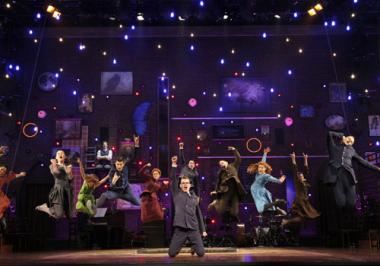"In the spring, a young man's fancy turns to thoughts of …" sex, suicide, masturbation, wet dreams, abortion—and other young men.
Frank Wedekind's daring play Spring Awakening was years ahead of its time—so far ahead that it wasn't produced till 1906, 15 years after its composition, and has been frequently banned ever since. What scandalized theatergoers 100 years ago still resonates today, according to director Toby Bercovici.
"I think it's a shockingly modern script," she says. "The things that shocked people back then still shock people. You still don't see a ton of rapes on stage, or masturbation. It's, like, racy."
The play condemns the repressed and repressive culture of 19th-century Germany by showing its toxic effect on the lives of several 14-year-olds: Wendla, whose mother can't bring herself to tell her daughter the facts of sex, with tragic results; Martha, abused by her strait-laced, hypocritical father; brilliant Melchior, whose rebellious nature infuriates his pompous schoolmasters; Moritz, whose lousy test scores make him want to blow his brains out; and Hansy and Ernst, who find safety and comfort in each other.
"Puberty is still a violent, depressing, strange period," Bercovici says. "It still doesn't work. Suicides, anti-depressants, bullying, sex when kids have no idea what it is—all that still exists, probably more now than it did then."
Bercovici's adaptation of the tale of innocence, ignorance and sexual awakening, which opens next weekend at UMass, is only one of the Spring Awakenings playing concurrently in the region. The Tony-winning musical version comes to the Bushnell in Hartford on Tuesday for a week's run.
The musical makes the play's relevance to contemporary adolescence, and its smoldering sexuality, explicit. The text isn't updated, but the musical numbers are set to indie rock with distinctly post-19th-century lyrics: "I go up to my room, turn the stereo on/ shoot up some You in the You of some song." The characters' frustrations and fantasies come out in music, but paradoxically, the songs' up-to-the-minute sensibility liberates them.
Bercovici, a grad student in the UMass Theater Department, says of the musical, "If they have rock 'n' roll to express themselves, then what's the problem? For me, the point is that they don't have that kind of outlet." She and dramaturg Emily Denison have subtitled their version "A Sin of Omission" because "it's what the parents won't tell their kids, more than the lies, that are so destructive."
They have adapted and "streamlined" the original script, cutting subplots to focus on the central characters and their crises, and replaced some sections of dialogue with dance sequences choreographed by Madelyne Camera. The actors playing the teenagers also double as the adults, putting on garish makeup for the transitions. "They're playing dress-up," Bercovici explains, "emulating grown-ups, wanting to be adults, but also satirizing them." The adult characters, especially the teachers, are two-dimensional, almost puppet-like figures, seen through the children's eyes as powerful oppressors.
Or as Melchior sings in the musical, "They bark and hound you, till everything you say is just another bad about you."
Spring Awakening: The Bushnell, 166 Capitol Avenue, Hartford, Feb. 23-28, (888) 824-2874, www.bushnell.org.
Spring Awakening: Curtain Theater, UMass, Amherst, Feb. 25-March 6, (413) 545-2511, (800) 999-UMAS or www.umass.edu/fac.



